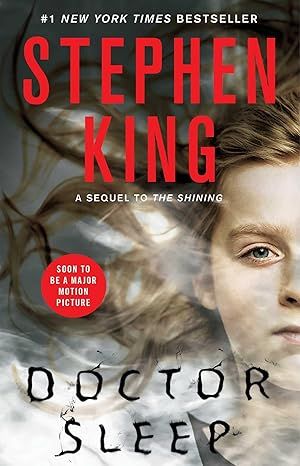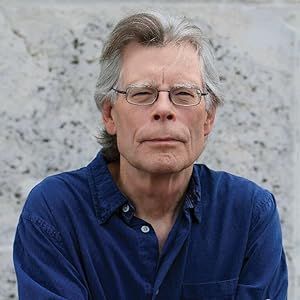Doctor SleepPaperback
4.6
-
42,277 ratings
Now a major motion picture starring Ewan McGregor!
From master storyteller Stephen King, his unforgettable and terrifying sequel to The Shining—an instant #1 New York Times bestseller that is “[a] vivid frightscape” (The New York Times).
Years ago, the haunting of the Overlook Hotel nearly broke young Dan Torrance’s sanity, as his paranormal gift known as “the shining” opened a door straight into hell. And even though Dan is all grown up, the ghosts of the Overlook—and his father’s legacy of alcoholism and violence—kept him drifting aimlessly for most of his life. Now, Dan has finally found some order in the chaos by working in a local hospice, earning the nickname “Doctor Sleep” by secretly using his special abilities to comfort the dying and prepare them for the afterlife. But when he unexpectedly meets twelve-year-old Abra Stone—who possesses an even more powerful manifestation of the shining—the two find their lives in sudden jeopardy at the hands of the ageless and murderous nomadic tribe known as the True Knot, reigniting Dan’s own demons and summoning him to battle for this young girl’s soul and survival...
Kindle
$9.99
Available instantly
Audiobook
$0.00
with membership trial
Hardcover
$10.49
Paperback
$10.49
Ships from
Amazon.com
Payment
Secure transaction
ISBN-10
1451698852
ISBN-13
978-1451698855
Print length
560 pages
Language
English
Publisher
Scribner
Publication date
June 09, 2014
Dimensions
5.31 x 1.4 x 8.25 inches
Item weight
1.04 pounds
Popular Highlights in this book
There came a time when you realized that moving on was pointless. That you took yourself with you wherever you went.
Highlighted by 3,836 Kindle readers
Life was a wheel, its only job was to turn, and it always came back to where it had started.
Highlighted by 2,463 Kindle readers
We’re all dying. The world’s just a hospice with fresh air.
Highlighted by 824 Kindle readers
Product details
ASIN :
B00A6CCF0K
File size :
6185 KB
Text-to-speech :
Enabled
Screen reader :
Supported
Enhanced typesetting :
Enabled
X-Ray :
Not Enabled
Word wise :
Enabled
Editorial Reviews
Stephen King is the author of more than sixty books, all of them worldwide bestsellers. His recent work includes the short story collection You Like It Darker, Holly (a New York Times Notable Book of 2023), Fairy Tale, Billy Summers, If It Bleeds, The Institute, Elevation, The Outsider, Sleeping Beauties (cowritten with his son Owen King), and the Bill Hodges trilogy: End of Watch, Finders Keepers, and Mr. Mercedes (an Edgar Award winner for Best Novel and a television series streaming on Peacock). His novel 11/22/63 was named a top ten book of 2011 by The New York Times Book Review and won the Los Angeles Times Book Prize for Mystery/Thriller. His epic works The Dark Tower, It, Pet Sematary, Doctor Sleep, and Firestarter are the basis for major motion pictures, with It now the highest-grossing horror film of all time. He is the recipient of the 2020 Audio Publishers Association Lifetime Achievement Award, the 2018 PEN America Literary Service Award, the 2014 National Medal of Arts, and the 2003 National Book Foundation Medal for Distinguished Contribution to American Letters. He lives in Bangor, Maine, with his wife, novelist Tabitha King.
Sample
CHAPTER ONE
WELCOME TO TEENYTOWN
1
After Wilmington, the daily drinking stopped.
He’d go a week, sometimes two, without anything stronger than diet soda. He’d wake up without a hangover, which was good. He’d wake up thirsty and miserable—wanting—which wasn’t. Then there would come a night. Or a weekend. Sometimes it was a Budweiser ad on TV that set him off—fresh-faced young people with nary a beergut among them, having cold ones after a vigorous volleyball game. Sometimes it was seeing a couple of nice-looking women having after-work drinks outside some pleasant little café, the kind of place with a French name and lots of hanging plants. The drinks were almost always the kind that came with little umbrellas. Sometimes it was a song on the radio. Once it was Styx, singing “Mr. Roboto.” When he was dry, he was completely dry. When he drank, he got drunk. If he woke up next to a woman, he thought of Deenie and the kid in the Braves t-shirt. He thought of the seventy dollars. He even thought of the stolen blanket, which he had left in the stormdrain. Maybe it was still there. If so, it would be moldy now.
Sometimes he got drunk and missed work. They’d keep him on for awhile—he was good at what he did—but then would come a day. When it did, he would say thank you very much and board a bus. Wilmington became Albany and Albany became Utica. Utica became New Paltz. New Paltz gave way to Sturbridge, where he got drunk at an outdoor folk concert and woke up the next day in jail with a broken wrist. Next up was Weston, after that came a nursing home on Martha’s Vineyard, and boy, that gig didn’t last long. On his third day the head nurse smelled booze on his breath and it was seeya, wouldn’t want to beya. Once he crossed the path of the True Knot without realizing it. Not in the top part of his mind, anyway, although lower down—in the part that shone—there was something. A smell, fading and unpleasant, like the smell of burned rubber on a stretch of turnpike where there has been a bad accident not long before.
From Martha’s Vineyard he took MassLines to Newburyport. There he found work in a don’t-give-much-of-a-shit veterans’ home, the kind of place where old soldiers were sometimes left in wheelchairs outside empty consulting rooms until their peebags overflowed onto the floor. A lousy place for patients, a better one for frequent fuckups like himself, although Dan and a few others did as well by the old soldiers as they could. He even helped a couple get over when their time came. That job lasted awhile, long enough for the Saxophone President to turn the White House keys over to the Cowboy President.
Dan had a few wet nights in Newburyport, but always with the next day off, so it was okay. After one of these mini-sprees, he woke up thinking at least I left the food stamps. That brought on the old psychotic gameshow duo.
Sorry, Deenie, you lose, but nobody leaves empty-handed. What have we got for her, Johnny?
Well, Bob, Deenie didn’t win any money, but she’s leaving with our new home game, several grams of cocaine, and a great big wad of FOOD STAMPS!
What Dan got was a whole month without booze. He did it, he guessed, as a weird kind of penance. It occurred to him more than once that if he’d had Deenie’s address, he would have sent her that crappy seventy bucks long ago. He would have sent her twice that much if it could have ended the memories of the kid in the Braves t-shirt and the reaching starfish hand. But he didn’t have the address, so he stayed sober instead. Scourging himself with whips. Dry ones.
Then one night he passed a drinking establishment called the Fisherman’s Rest and through the window spied a good-looking blonde sitting alone at the bar. She was wearing a tartan skirt that ended at mid-thigh and she looked lonely and he went in and it turned out she was newly divorced and wow, that was a shame, maybe she’d like some company, and three days later he woke up with that same old black hole in his memory. He went to the veterans’ center where he had been mopping floors and changing lightbulbs, hoping for a break, but no dice. Don’t-give-much-of-a-shit wasn’t quite the same as don’t-give-any-shit; close but no cigar. Leaving with the few items that had been in his locker, he recalled an old Bobcat Goldthwait line: “My job was still there, but somebody else was doing it.” So he boarded another bus, this one headed for New Hampshire, and before he got on, he bought a glass container of intoxicating liquid.
He sat all the way in back in the Drunk Seat, the one by the toilet. Experience had taught him that if you intended to spend a bus trip getting smashed, that was the seat to take. He reached into the brown paper sack, loosened the cap on the glass container of intoxicating liquid, and smelled the brown smell. That smell could talk, although it only had one thing to say: Hello, old friend.
He thought Canny.
He thought Mama.
He thought of Tommy going to school by now. Always assuming good old Uncle Randy hadn’t killed him.
He thought, The only one who can put on the brakes is you.
This thought had come to him many times before, but now it was followed by a new one. You don’t have to live this way if you don’t want to. You can, of course . . . but you don’t have to.
That voice was so strange, so unlike any of his usual mental dialogues, that he thought at first he must be picking it up from someone else—he could do that, but he rarely got uninvited transmissions anymore. He had learned to shut them off. Nevertheless he looked up the aisle, almost positive he would see someone looking back at him. No one was. Everyone was sleeping, talking with their seatmates, or staring out at the gray New England day.
You don’t have to live this way if you don’t want to.
If only that were true. Nevertheless, he tightened the cap on the bottle and put it on the seat beside him. Twice he picked it up. The first time he put it down. The second time he reached into the bag and unscrewed the cap again, but as he did, the bus pulled into the New Hampshire welcome area just across the state line. Dan filed into the Burger King with the rest of the passengers, pausing only long enough to toss the paper bag into one of the trash containers. Stenciled on the side of the tall green can were the words IF YOU NO LONGER NEED IT, LEAVE IT HERE.
Wouldn’t that be nice, Dan thought, hearing the clink as it landed. Oh God, wouldn’t that be nice.
2
An hour and a half later, the bus passed a sign reading WELCOME TO FRAZIER, WHERE THERE’S A REASON FOR EVERY SEASON! And, below that, HOME OF TEENYTOWN!
The bus stopped at the Frazier Community Center to take on passengers, and from the empty seat next to Dan, where the bottle had rested for the first part of the trip, Tony spoke up. Here was a voice Dan recognized, although Tony hadn’t spoken so clearly in years.
(this is the place)
As good as any, Dan thought.
He grabbed his duffel from the overhead rack and got off. He stood on the sidewalk and watched the bus pull away. To the west, the White Mountains sawed at the horizon. In all his wanderings he had avoided mountains, especially the jagged monsters that broke the country in two. Now he thought, I’ve come back to the high country after all. I guess I always knew I would. But these mountains were gentler than the ones that still sometimes haunted his dreams, and he thought he could live with them, at least for a little while. If he could stop thinking about the kid in the Braves t-shirt, that is. If he could stop using the booze. There came a time when you realized that moving on was pointless. That you took yourself with you wherever you went.
A snow flurry, fine as wedding lace, danced across the air. He could see that the shops lining the wide main street catered mostly to the skiers who’d come in December and the summer people who’d come in June. There would probably be leaf-peepers in September and October, too, but this was what passed for spring in northern New England, an edgy eight weeks chrome-plated with cold and damp. Frazier apparently hadn’t figured out a reason for this season yet, because the main drag—Cranmore Avenue—was all but deserted.
Dan slung the duffel over his shoulder and strolled slowly north. He stopped outside a wrought-iron fence to look at a rambling Victorian home flanked on both sides by newer brick buildings. These were connected to the Victorian by covered walkways. There was a turret at the top of the mansion on the left side, but none on the right, giving the place a queerly unbalanced look that Dan sort of liked. It was as if the big old girl were saying Yeah, part of me fell off. What the fuck. Someday it’ll happen to you. He started to smile. Then the smile died.
Tony was in the window of the turret room, looking down at him. He saw Dan looking up and waved. The same solemn wave Dan remembered from his childhood, when Tony had come often. Dan closed his eyes, then opened them. Tony was gone. Had never been there in the first place, how could he have been? The window was boarded up.
The sign on the lawn, gold letters on a green background the same shade as the house itself, read HELEN RIVINGTON HOUSE.
They have a cat in there, he thought. A gray cat named Audrey.
This turned out to be partly right and partly wrong. There was a cat, and it was gray, but it was a neutered tom and its name wasn’t Audrey.
Dan looked at the sign for a long time—long enough for the clouds to part and send down a biblical beam—and then he walked on. Although the sun was now bright enough to twinkle the chrome of the few slant-parked cars in front of Olympia Sports and the Fresh Day Spa, the snow still swirled, making Dan think of something his mother had said during similar spring weather, long ago, when they had lived in Vermont: The devil’s beating his wife.
3
A block or two up from the hospice, Dan stopped again. Across the street from the town municipal building was the Frazier town common. There was an acre or two of lawn, just beginning to show green, a bandstand, a softball field, a paved basketball half-court, picnic tables, even a putting green. All very nice, but what interested him was a sign reading
VISIT TEENYTOWN
FRAZIER’S “SMALL WONDER”
AND RIDE THE TEENYTOWN RAILWAY!
It didn’t take a genius to see that Teenytown was a teeny replica of Cranmore Avenue. There was the Methodist church he had passed, its steeple rising all of seven feet into the air; there was the Music Box Theater; Spondulicks Ice Cream; Mountain Books; Shirts & Stuff; the Frazier Gallery, Fine Prints Our Specialty. There was also a perfect waist-high miniature of the single-turreted Helen Rivington House, although the two flanking brick buildings had been omitted. Perhaps, Dan thought, because they were butt-ugly, especially compared to the centerpiece.
Beyond Teenytown was a miniature train with TEENYTOWN RAILWAY painted on passenger cars that were surely too small to hold anyone larger than toddler size. Smoke was puffing from the stack of a bright red locomotive about the size of a Honda Gold Wing motorcycle. He could hear the rumble of a diesel engine. Printed on the side of the loco, in old-fashioned gold flake letters, was THE HELEN RIVINGTON. Town patroness, Dan supposed. Somewhere in Frazier there was probably a street named after her, too.
He stood where he was for a bit, although the sun had gone back in and the day had grown cold enough for him to see his breath. As a kid he’d always wanted an electric train set and had never had one. Yonder in Teenytown was a jumbo version kids of all ages could love.
He shifted his duffel bag to his other shoulder and crossed the street. Hearing Tony again—and seeing him—was unsettling, but right now he was glad he’d stopped here. Maybe this really was the place he’d been looking for, the one where he’d finally find a way to right his dangerously tipped life.
You take yourself with you, wherever you go.
He pushed the thought into a mental closet. It was a thing he was good at. There was all sorts of stuff in that closet.
4
A cowling surrounded the locomotive on both sides, but he spied a footstool standing beneath one low eave of the Teenytown Station, carried it over, and stood on it. The driver’s cockpit contained two sheepskin-covered bucket seats. It looked to Dan as if they had been scavenged from an old Detroit muscle car. The cockpit and controls also looked like modified Detroit stock, with the exception of an old-fashioned Z-shaped shifter jutting up from the floor. There was no shift pattern; the original knob had been replaced with a grinning skull wearing a bandanna faded from red to pallid pink by years of gripping hands. The top half of the steering wheel had been cut off, so that what remained looked like the steering yoke of a light plane. Painted in black on the dashboard, fading but legible, was TOP SPEED 40 DO NOT EXCEED.
“Like it?” The voice came from directly behind him.
Dan wheeled around, almost falling off the stool. A big weathered hand gripped his forearm, steadying him. It was a guy who looked to be in his late fifties or early sixties, wearing a padded denim jacket and a red-checked hunting cap with the earflaps down. In his free hand was a toolkit with PROPERTY OF FRAZIER MUNICIPAL DEPT Dymo-taped across the top.
“Hey, sorry,” Dan said, stepping off the stool. “I didn’t mean to—”
“S’all right. People stop to look all the time. Usually model-train buffs. It’s like a dream come true for em. We keep em away in the summer when the place is jumpin and the Riv runs every hour or so, but this time of year there’s no we, just me. And I don’t mind.” He stuck out his hand. “Billy Freeman. Town maintenance crew. The Riv’s my baby.”
Dan took the offered hand. “Dan Torrance.”
Billy Freeman eyed the duffel. “Just got off the bus, I ’magine. Or are you ridin your thumb?”
“Bus,” Dan said. “What does this thing have for an engine?”
“Well now, that’s interesting. Probably never heard of the Chevrolet Veraneio, didja?”
He hadn’t, but knew anyway. Because Freeman knew. Dan didn’t think he’d had such a clear shine in years. It brought a ghost of delight that went back to earliest childhood, before he had discovered how dangerous the shining could be.
“Brazilian Suburban, wasn’t it? Turbodiesel.”
Freeman’s bushy eyebrows shot up and he grinned. “Goddam right! Casey Kingsley, he’s the boss, bought it at an auction last year. It’s a corker. Pulls like a sonofabitch. The instrument panel’s from a Suburban, too. The seats I put in myself.”
The shine was fading now, but Dan got one last thing. “From a GTO Judge.”
Freeman beamed. “That’s right. Found em in a junkyard over Sunapee way. The shifter’s a high-hat from a 1961 Mack. Nine-speed. Nice, huh? You lookin for work or just lookin?”
Dan blinked at the sudden change of direction. Was he looking for work? He supposed he was. The hospice he’d passed on his amble up Cranmore Avenue would be the logical place to start, and he had an idea—didn’t know if it was the shining or just ordinary intuition—that they’d be hiring, but he wasn’t sure he wanted to go there just yet. Seeing Tony in the turret window had been unsettling.
Also, Danny, you want to be a little bit farther down the road from your last drink before you show up there askin for a job application form. Even if the only thing they got is runnin a buffer on the night shift.
Dick Hallorann’s voice. Christ. Dan hadn’t thought of Dick in a long time. Maybe not since Wilmington.
With summer coming—a season for which Frazier most definitely had a reason—people would be hiring for all sorts of things. But if he had to choose between a Chili’s at the local mall and Teenytown, he definitely chose Teenytown. He opened his mouth to answer Freeman’s question, but Hallorann spoke up again before he could.
You’re closing in on the big three-oh, honey. You could be runnin out of chances.
Meanwhile, Billy Freeman was looking at him with open and artless curiosity.
“Yes,” he said. “I’m looking for work.”
“Workin in Teenytown, wouldn’t last long, y’know. Once summer comes and the schools let out, Mr. Kingsley hires local. Eighteen to twenty-two, mostly. The selectmen expect it. Also, kids work cheap.” He grinned, exposing holes where a couple of teeth had once resided. “Still, there are worse places to make a buck. Outdoor work don’t look so good today, but it won’t be cold like this much longer.”
No, it wouldn’t be. There were tarps over a lot of stuff on the common, but they’d be coming off soon, exposing the superstructure of small-town resort summer: hotdog stands, ice cream booths, a circular something that looked to Dan like a merry-go-round. And there was the train, of course, the one with the teeny passenger cars and the big turbodiesel engine. If he could stay off the sauce and prove trustworthy, Freeman or the boss—Kingsley—might let him drive it a time or two. He’d like that. Farther down the line, when the municipal department hired the just-out-of-school local kids, there was always the hospice.
If he decided to stay, that was.
You better stay somewhere, Hallorann said—this was Dan’s day for hearing voices and seeing visions, it seemed. You better stay somewhere soon, or you won’t be able to stay anywhere.
He surprised himself by laughing. “It sounds good to me, Mr. Freeman. It sounds really good.”
5
“Done any grounds maintenance?” Billy Freeman asked. They were walking slowly along the flank of the train. The tops of the cars only came up to Dan’s chest, making him feel like a giant.
“I can weed, plant, and paint. I know how to run a leaf blower and a chainsaw. I can fix small engines if the problem isn’t too complicated. And I can manage a riding mower without running over any little kids. The train, now . . . that I don’t know about.”
“You’d need to get cleared by Kingsley for that. Insurance and shit. Listen, have you got references? Mr. Kingsley won’t hire without em.”
“A few. Mostly janitorial and hospital orderly stuff. Mr. Freeman—”
“Just Billy’ll do.”
“Your train doesn’t look like it could carry passengers, Billy. Where would they sit?”
Billy grinned. “Wait here. See if you think this is as funny as I do. I never get tired of it.”
Freeman went back to the locomotive and leaned in. The engine, which had been idling lazily, began to rev and send up rhythmic jets of dark smoke. There was a hydraulic whine along the whole length of The Helen Rivington. Suddenly the roofs of the passenger wagons and the yellow caboose—nine cars in all—began to rise. To Dan it looked like the tops of nine identical convertibles all going up at the same time. He bent down to look in the windows and saw hard plastic seats running down the center of each car. Six in the passenger wagons and two in the caboose. Fifty in all.
When Billy came back, Dan was grinning. “Your train must look very weird when it’s full of passengers.”
“Oh yeah. People laugh their asses off and burn yea film, takin pitchers. Watch this.”
There was a steel-plated step at the end of each passenger car. Billy used one, walked down the aisle, and sat. A peculiar optical illusion took hold, making him look larger than life. He waved grandly to Dan, who could imagine fifty Brobdingnagians, dwarfing the train upon which they rode, pulling grandly out of Teenytown Station.
As Billy Freeman rose and stepped back down, Dan applauded. “I’ll bet you sell about a billion postcards between Memorial Day and Labor Day.”
“Bet your ass.” Billy rummaged in his coat pocket, brought out a battered pack of Duke cigarettes—a cut-rate brand Dan knew well, sold in bus stations and convenience stores all over America—and held it out. Dan took one. Billy lit them up.
“I better enjoy it while I can,” Billy said, looking at his cigarette. “Smoking’ll be banned here before too many more years. Frazier Women’s Club’s already talkin about it. Bunch of old biddies if you ask me, but you know what they say—the hand that rocks the fuckin cradle rules the fuckin world.” He jetted smoke from his nostrils. “Not that most of them have rocked a cradle since Nixon was president. Or needed a Tampax, for that matter.”
“Might not be the worst thing,” Dan said. “Kids copy what they see in their elders.” He thought of his father. The only thing Jack Torrance had liked better than a drink, his mother had once said, not long before she died, was a dozen drinks. Of course what Wendy had liked was her cigarettes, and they had killed her. Once upon a time Dan had promised himself he��’d never get going with that habit, either. He had come to believe that life was a series of ironic ambushes.
Billy Freeman looked at him, one eye squinted mostly shut. “I get feelins about people sometimes, and I got one about you.” He pronounced got as gut, in the New England fashion. “Had it even before you turned around and I saw your face. I think you might be the right guy for the spring cleanin I’m lookin at between now and the end of May. That’s how it feels to me, and I trust my feelins. Prob’ly crazy.”
Dan didn’t think it was crazy at all, and now he understood why he had heard Billy Freeman’s thoughts so clearly, and without even trying. He remembered something Dick Hallorann had told him once—Dick, who had been his first adult friend. Lots of people have got a little of what I call the shining, but mostly it’s just a twinkle—the kind of thing that lets em know what the DJ’s going to play next on the radio or that the phone’s gonna ring pretty soon.
Billy Freeman had that little twinkle. That gleam.
“I guess this Cary Kingsley would be the one to talk to, huh?”
“Casey, not Cary. But yeah, he’s the man. He’s run municipal services in this town for twenty-five years.”
“When would be a good time?”
“Right about now, I sh’d think.” Billy pointed. “Yonder pile of bricks across the street’s the Frazier Municipal Building and town offices. Mr. Kingsley’s in the basement, end of the hall. You’ll know you’re there when you hear disco music comin down through the ceiling. There’s a ladies’ aerobics class in the gym every Tuesday and Thursday.”
“All right,” Dan said, “that’s just what I’m going to do.”
“Got your references?”
“Yes.” Dan patted the duffel, which he had leaned against Teenytown Station.
“And you didn’t write them yourself, nor nothin?”
Danny smiled. “No, they’re straight goods.”
“Then go get im, tiger.”
“Okay.”
“One other thing,” Billy said as Dan started away. “He’s death on drinkin. If you’re a drinkin man and he asts you, my advice is . . . lie.”
Dan nodded and raised his hand to show he understood. That was a lie he had told before.
Read more
About the authors
Stephen King
Stephen King is the author of more than fifty books, all of them worldwide bestsellers. His first crime thriller featuring Bill Hodges, MR MERCEDES, won the Edgar Award for best novel and was shortlisted for the CWA Gold Dagger Award. Both MR MERCEDES and END OF WATCH received the Goodreads Choice Award for the Best Mystery and Thriller of 2014 and 2016 respectively.
King co-wrote the bestselling novel Sleeping Beauties with his son Owen King, and many of King's books have been turned into celebrated films and television series including The Shawshank Redemption, Gerald's Game and It.
King was the recipient of America's prestigious 2014 National Medal of Arts and the 2003 National Book Foundation Medal for distinguished contribution to American Letters. In 2007 he also won the Grand Master Award from the Mystery Writers of America. He lives with his wife Tabitha King in Maine.
Read more
Reviews
Customer reviews
4.6 out of 5
42,277 global ratings
Marc Goldfinger
5
Doctor Sleep--by Stephen King
Reviewed in the United States on October 12, 2013
Verified Purchase
The Turning Point: Doctor Sleep by Stephen King By Marc D. Goldfinger “We stood at the turning point. Half-measures availed us nothing.” The Big Book of Alcoholics Anonymous
I’ve been reading Stephen King since I was young. Let me make this clear: young is a variable for me. The first book I ever read by Stephen King was The Stand, a book of about 800 pages. It was supposed to be longer but King’s publisher didn’t think a book that ran over 1100 pages would sell, so they asked King to cut, cut, cut, but no pasting, until they felt it was marketable.
The ravaged version, which, by the way, was great, came out in 1978. Years later, when King’s popularity was peaking, they released the full version. This was in 1990. It is now 2013 and Stephen King, after completing his magnum opus called The Dark Tower, is at his best.
King’s newest book, Doctor Sleep, was just released (528 pages). Way back when King was starting out, he wrote a book called The Shining, which was later made into movie starring Jack Nicholson. My guess would be that more people saw the movie than read the book, although the book sold quite well. The Shining has 447 pages, which makes it one of King’s shorter novels.
To appreciate Doctor Sleep, one does not need to go back and read The Shining, however, it might add some flavor to the experience. Loosely speaking, they are sequential.
The main character in Doctor Sleep is Dan Torrance. He is in his early 30’s in Doctor Sleep; in The Shining Dan Torrance is a little boy who sees more than the normal person. To be hyper-aware is not always a gift. If you can shake someone’s hand and see their imminent death, it’s hard to smile and say, “Have a good day and it was nice to meet you.”
As an avid reader, I hate book reviews that spoil the fun, if that would be the proper word to use for one of Stephen King’s books. I find myself faced with a conundrum. I don’t want to spoil Doctor Sleep. But I do want to tell you why I think it is Stephen King’s best book.
It’s quite different than his 7 book Dark Tower series- which is the modern Lord of the Rings. But Doctor Sleep touched me in a very special way.
If you happen to be an alcoholic in recovery, you will love Doctor Sleep. Boy, I put myself out on a limb there, didn’t I? But really, I mean it. Even if you’ve never read a King book before, if you are in recovery, just pick it up and read the first ten pages, including the quotes at the beginning of the book.
I’ll go one step further. If you’re an alcoholic or a drug addict who is still using but doesn’t want to use anymore, pick up Doctor Sleep and read it. Then go to an AA meeting or an NA meeting. You don’t have to wait until you finish the book. After all, you’ll want to be sober enough to remember the damn thing, right?
Just like Dan Torrance had the Shining when he was a child, in Doctor Sleep there is a little girl named Abra Stone who Shines like the sun. She’s got some power, all to the good.
There are other folks cruising down the highways and byways of America. You’ve probably seen them in their big RV’s, mostly retired people who are past their mid-sixties. Looks are deceiving my friend. Just like there are motorcycle clubs called The Devil’s Disciples, it could be that not all of these old folks have warmth in their hearts.
There is a gang of them that calls themselves The True Knot and they hunger to live. What they need is children who Shine and, just like vampires drink blood, these folks drink the Essence of the children. No, no, the children don’t survive. The True Knot has been around a long time. They traveled in covered wagons back in the day.
And, just like true Bikers, these folks have names like Steamhead Steve, Black-eyed Susie, Diesel Doug, & Steve the Chink, who is not Chinese. Their leader is a big woman who wears a sinister top hat and they call her Rosie the Hat.
They don’t like dogs and dogs don’t like them but they love children. Children who Shine. You know that statement from the old rock songs, “you always hurt the one you love”. The True Knot does just that.
Abra Stone picked up on The True Knot when they were draining the Steam from this young man, about 12 years old and never to see another birthday—she hooked in on what they were doing with her Shining and began to scream as she pulled away.
Not quick enough. Rosie the Hat sensed her and knew that, whoever that young girl was, she was definitely a large store of food for The True Knot. And that’s all I can say about that because I don’t want to ruin the story for you.
Dan Torrance, who we talked about before, has a job to do. When the teacher is ready, the student will appear. That’s an old saying. I don’t even know where it came from but it definitely applies here. But this is enough about Doctor Sleep. I’ve probably told you more than you want to know. This is Stephen King at his best and his heart is really in this book.
All of us, one way or another, reach a turning point in our lives and we either take the path we were meant to take—or we slip down the dark road. I’ll have to say that I was lucky and took the right path after 30 years of dark road. But it’s never too late for anyone as long as they are alive.
Now I get to read and collect these books, of which Doctor Sleep is one. Even if you don’t like to read Stephen King, this is the book to jump on. If you like it, pass it on. If you don’t like it, well write to me and complain. I’ll hear you out.
But watch out for caravans of RV’s with those bumper stickers that say “Old but not dead, save Medicare, I’m a conservative and I vote.” You never know whether they’re out hunting or Sight-seeing.
Oh, Doctor Sleep works in a Hospice. We come to find that the ties that bind a family together are stronger than we believe. The truth is always just one stranger away.
Whether you are a friend of Bill’s or just a close cousin, this is not a book to miss. _”DoctorSleepBook.com”—SimonandShuster.com”
Read more
15 people found this helpful
Kathy Cunningham
5
Strong sequel to THE SHINING -- "Life is a wheel, and it always comes back around"
Reviewed in the United States on September 25, 2013
Verified Purchase
I've always thought THE SHINING was Stephen King's best novel. It was scary in ways that creep up inside your skin and just never let go. The ghosts in the Overlook Hotel may have been terrifying, but that's not what made that novel so chilling - no, it's what happened to Jack Torrance, a man who loved his son with his heart and soul, but still allowed the demons to use him against the boy. And it wasn't the ghosts that were the most dangerous; it was Jack himself, and the kind of demons so many of us have inside us. DOCTOR SLEEP, King's sequel to THE SHINING, brought me back to the Torrance family, back to Danny and Wendy and Jack, back to wonderful Dick Hallorann, chef of the Overlook and hero of Danny's childhood, and back to Tony, the imaginary friend who tried to help Danny through the worst of his nightmares. DOCTOR SLEEP reminds me of the "old Stephen King," the King of DEAD ZONE and `SALEM'S LOT and THE STAND. It's a great book with a big story, a story that reaches across America and highlights once more that there are such things as Good and Evil in the world, and that it is sometimes necessary to risk everything to stand for one and against the other.
In DOCTOR SLEEP, Danny Torrence is Dan, haunted by the horrors he experienced that winter in Colorado when he was five. He carries with him his father's legacy - a thirst for drink, and a temper that's hard to control. King fills in some of the story for us, about Danny's struggles in the years following his father's death (Hallorann helps with that), about Wendy's injuries that never quite heal, and about the mess adult Dan makes of his life, including his alcoholism, his self-destructive behavior, and his unrelenting depression. Then, he finds himself in a little town in New Hampshire called Frazier, and a familiar voice in his head suggests "this is the place." In Frazier he finds AA, forever friends, a job with purpose (using his "shining" to help hospice patients ease their way into death), and a girl named Abra who seems to "shine" brighter than even Dan did when he was young. But there is a group of deranged people out there called the True Knot (Dan calls them a "paranormal Manson family"); they want Abra so they can feed on her essence (or "steam," as they call it). Their leader, a woman called Rose the Hat, knows how strong Abra is, and how much "steam" she possesses. Can Dan help Abra fight Rose and the True Knot, or are his own demons too strong? And once the True Knot sets up camp at the location of the long-gone Overlook Hotel, will Dan's past rise up to hurt or to help him?
DOCTOR SLEEP, like THE SHINING, really is about inner demons. Some of them are of the paranormal kind (Dan works hard to shut away the ghosts from the Overlook and it isn't easy), but some are a part of us, our own weaknesses and failings that get in the way of our best selves. Those, Dan discovers, are much harder to defeat and take much greater courage. The book is also about finding your true place in the world (or purpose, perhaps) and about repaying debts. Hallorann helped Dan when he was a child; now Dan will help Abra. As King describes it, "Life is a wheel, and it always comes back around."
Those familiar with THE SHINING only through the Kubrick film would be advised to read King's book before reading DOCTOR SLEEP. The two novels are intricately connected, like woven strands of one story. There are also significant differences between the novel and the Kubrick film which might confuse readers picking up the sequel without having read the original - the biggest difference, of course, is Hallorann, who is abruptly killed in the film but proves himself a hero in King's novel). A bigger difference, however, is Jack Torrence's character - the scariest, most horrifying scene in THE SHINING is the one where Jack is chasing his son with an ax, raging at him to "take his medicine" but also desperately screaming for him to "run, run, run!" It's this internal conflict between the influences of Good and Evil that define Jack's character - and none of this is present in Kubrick's film. Since those same conflicts are so important in DOCTOR SLEEP, it would make sense to know what they're all about before diving in.
Reading DOCTOR SLEEP felt very much like curling up with an old friend. I admire King's ability to completely immerse his readers in his characters, his settings, and his stories - I didn't want to put this one down until I'd reached the final page. I also admire King's knack for combining cultural references (you'll find mentions of "Twilight," "Harry Potter," "CSI," and Nancy Grace) alongside surprising literary allusions (watch for nods to T. S. Eliot, Shakespeare, Malamud, and Dickens). And then there's one very minor character named for Jame Gumm's first victim in Harris's SILENCE OF THE LAMBS (King knows how to turn the screw before you even know he has a screwdriver in his hand!). This is a rich and satisfying novel that's both desperately sad and beautifully uplifting. I enjoyed every minute of it. Very well done, Mr. King.
Read more
10 people found this helpful
Tom
5
The sequel to the Shining redeems the characters of Stephen King's early novels.
Reviewed in the United States on December 3, 2013
Verified Purchase
I love Stephen King's classic early novels - Salem's Lot, Carrie and the Shining, and I think the Shining may be my favorite of the three. You can imagine my excitement at learning that Stephen King had written a sequel to the Shining.
Doctor Sleep is a great story. I don't think it is as good as the Shining, but it doesn't try to be, and that works. Much like a child who finds his own identity separate and distinct from those of his parents, Doctor Sleep is rooted in the Shining but quickly cuts its own trail. The story begins in darkness, finding the gifted young protagonist of the Shining all grown up and wandering the earth in haze of substance abuse and addiction. His protectors - Danny's mother Wendy and his mentor, Dick Hallorann - are dead and gone, leaving Danny alone to cope with his addiction and emotional scarring.
However, where Jack Torrance reacted to his addictions self-justified rage, Danny gives in to despair and hopelessness. He is fully aware of his life's downward spiral and all he can do is stand by and watch as he heads for rock bottom. In its darkest moments, Doctor Sleep seems even more personal and revealing than the Shining.
Despite this bleak hopelessness, however, Doctor Sleep is ultimately a story of redemption and in many ways, it feels like that redemption extends to the characters of all three of Stephen King's first novels. Although the protagonists of Salem's Lot and the Shining survive their respective ordeals, survival, it turns out, is a bittersweet victory. Families are torn apart, communities lost and lives altered forever. And of course, poor Carrie White didn't even survive her story. Doctor Sleep redeems all three by taking up their causes in the form of Abra Stone, a child who shines far brighter than even Danny. Gifted and extremely powerful, Abra is also compassionate and wise beyond her years. Unlike Danny and Carrie, Abra is largely spared the emotional wounds of childhood trauma. Her parents are loving and supportive (albeit in denial about her gift) and Abra is shockingly well-adjusted. Despite her talents, Abra is happy, has plenty of friends, does well in school and by all appearances, seems like an ordinary child.
Her shine enables Abra to develop a bond with Danny, who tries to become a mentor to her, just as Dick Hallorann was to him. Abra also attracts the attention of a traveling coven of serial killers who prey on those who shine. Calling themselves the True Knot, they travel the country, kidnapping, torturing and murdering gifted individuals (mostly children) to take their "steam" - their spiritual essence - as it escapes their dying bodies. "Taking steam" makes these killers immortal (and no longer human) - so long as they can find enough steam to feed. When the True Knot discovers Abra, they see an opportunity for an endless source of steam, with plans to hold her in captivity and slowly bleed the steam from her with torture.
Much like his mentor did for him, Danny finds himself rushing to rescue Abra from the True Knot. For him, it is as much about redeeming his soul, exorcising the memories of the Overlook and atoning for his own transgressions, as it is about saving Abra. Abra, however, is not necessarily a helpless child in distress. Under her cheerful exterior there is frighteningly intense, steely resolve. As the story reveals more of Abra's character, I began to wonder if this is how Carrie would have ended up had she grown up in a loving, accepting home. Or if this is what Danny might have become if not for his father's murderous rampage. Abra refuses to be a victim and takes on the True Knot, head on. Unlike Ben and Mark, who just manage to make it out of Salem's Lot alive, Abra isn't interested in just surviving - she intends to win.
The combination of these elements makes Doctor Sleep great fun. The battle royale finale alone is worth the price of admission. But don't come expecting the Shining. Doctor Sleep is its own novel and it makes no apologies for that.
Read more
Leslie Truver
5
I loved it! Almost perfect.
Reviewed in the United States on October 4, 2013
Verified Purchase
First off: I promise, NO SPOILERS. I apologize if there is some vagueness as a result.
I'd like to write two reviews for Dr. Sleep: one on its stand-alone merits, and as a continuation of the story of the Shining, and one on its success as a continuation of the brilliance of The Shining. I'd give the first 5 stars, but the second only...3. Which is unfair, I guess, especially in light of Stephen King's afterward ("...people change. The man who wrote Doctor Sleep is very different from the well-meaning alcoholic who wrote The Shining, but both remain interested in the same thing: telling a kickass story. I enjoyed finding Danny Torrance again and following his adventures. I hope you did, too. If that's the case, Constant Reader, we're all good.")--which seems to say that my first 5 star review is the one King would care about, if I were to presume he cares what I have to say. And since I love Stephen King, that's what I gave it, officially, and that's the one I'll start with.
This book is SUCH a fun read! The best kind of King book, the kind that leaves you hungover in the morning because you were up much too late reading, and almost makes you miss your bus to work because you get engrossed in it again while you brush your teeth. Several times I got a big giddy grin on my face and even laughed aloud with ridiculous delight at a super stephenkingy turn of phrase, words I imagined gave him a similar satisfaction as they left his fingers for the page. Some of these were even scary-creepy things, but they were so perfectly done, they were thrilling on that second level, too. It felt to me like King had a lot of fun with a lot of this book, just reveling in his own GoodAtItNess, long passages spooling out with gleeful sprezzatura.
The story runs smoothly along, suspenseful questions answered with perfect timing, never leaving so much unknown at once that the complications are impossible to follow. The central characters are excellent. Grownup Dan surprisingly unlike 5 year old Dan in the way my own grownup children are surprisingly unlike their 5 year old selves--something of the little boy remains, but he didn't just stretch to man-size, he's a fully realized person, very changed. Abra is a great character on her own, and her relationships with Dan, her parents, and her friends, are all truthful and nuanced. Good on whoever talked King through the markers of early adolescent girlness that pepper her believability. The scary creepy horrors are scary, creepy, and horrible; turning off the light when I finally forced myself every night was just as unpleasant as it had been when I read The Shining.
Loose strings of the original plot are nicely knotted up. I'd have maybe liked to know more about Wendy, but real grown men--as Dan is, in this novel--don't have the kind of insight or, frankly, interest, in their mothers' inner lives. Even if they're psychic. So it works, as a function of Grownup Dan being well done. Less likely, I thought, was the way Dick was written out of Dan's life, but I have to admit that works too, in the sense that Dan grew up in ways that were unpredictable when he was five. Expository backstory from the first book doesn't get the clumsy treatment it normally does in sequels, but is dropped in usefully and gracefully throughout the plot. It was very satisfying to have some things I thought I understood about the Overlook, and Dan, and Jack, confirmed, and equally satisfying to have some new details mixed in to deepen and thicken that foundation of the story. The final revisitation from The Shining gets a muted, subtle treatment in the narrative, and I hope it's not just sentimental over-imagination on my part to think King let it be so simple because it might have been unbearably moving otherwise.
Five stars! Buy it, read it, you'll enjoy it!
Now then. The Shining is one of my all-time favorite books. It's the one I wax rhapsodic about when I'm making an obnoxiously over-thought case for Stephen King as an underrated capital G genius of American capital L literature. It's the one I compare to Dickens and the one I compare to Steinbeck and the one I say doesn't need to lean on those comparisons because it's capital G greatness all by itself. I like to make people listen to me say that the only reason The Shining is not a genuine masterpiece, recognized or not, is that King was young and still growing as a writer. And still not so market-proven that his (now routinely over-indulgent) editors gave him free reign. I have always assumed those factors caused the flaws (I apologize for my cheek, Mr. King; I know I'm unworthy, but for lack of a better, more obsequious term, I have to go with flaws) in The Shining, and I was unrestrainedly thrilled to hear a sequel unaffected by those was in the works. I refused to entertain fears that I wouldn't like it as much as the original, the way absolutely everyone likes the sequel less than the original; when the first reviews came out and I read that Barbara Kingsolver loved Dr. Sleep, I went directly to Kindle, did not pass go, and Amazon collected my seven dollars. And it was, as I've already said, money well and unregrettedly spent.
But this book isn't anything like The Shining. Not as a literary feat. Both books tell, as King says he intended, kickass stories. The Shining, though, spent its first half telling a fascinatingly ambiguous story, too. The Shining is about a man with demons we all recognize, and a lot of us live with intimately. For a good chunk of the beginning of the book, it is impossible to determine from the text alone whether or not those demons are the only demons in the Torrance family's life. The interplay between Jack and his family and the things in Jack's head is fantastic, and the aforementioned flaw is that the transition between "Is This Real or Is Jack Just Crazy" to "Oh, yeah, it's real. Jack's crazy, too, but that's secondary" is less smoothly done than the writing on either side of the divide. And Dr. Sleep has nothing at all like that. The kickass story is all out in the open and straightforwardly linear, as is the development of all the characters and the reader's understanding of who they are and what they're doing.
Dr. Sleep is extragood pop culture writing. The Shining was that, with unrecognized actual literature icing its cake. Without the icing, I give it three stars.
Read more
14 people found this helpful
FredReadIt
5
Whatever Happened to...
Reviewed in the United States on October 5, 2013
Verified Purchase
When I was a hyperactive and slightly crazed child I learned to read by reading comic books. And yes I'll admit that at first all I did was look at the pictures, but eventually I found myself running in to my parents to try and figure out what exactly Spiderman, The Hulk, The Avengers, and the X-Men were saying. The comic books instilled within me the desire to learn because I found them vastly entertaining and interesting. At the same time as this I was living out in the country and we only had four TV channels, ABC, NBC, CBS, and KTVU Channel 2 out of San Francisco. I know in this age where we have hundreds, upon hundreds of channels to choose from, that its hard to imagine just having four TV channels, but that's what I grew up with. One of my favorite TV Channels outs, of the big four I had to choose from, was the independent KTVU Ch.2 and the reason I liked it more than the others was that on Friday Nights they would have Creature Feature movies, which were hosted by a dude named Bob Wilkins, who had a great sense of humor and always had great intros to the movies he'd play like, Frankenstein, Dracula, the Werewolf, and a whole bunch of other great black and white horror films. I thought these films were just great because they opened me up to the wild world of horror.
And then somewhere around the seventh grade I discovered Stephen King and everything changed...
Stephen King took the horror that I saw on Creature Features and made it scary. The Stephen King novels were the first full length books that I read for pleasure. At the time I would have told you that it was the subject matter that drew me to the books, but as I look back now, I think it was more the way he told his stories. The Creature Feature Movies and the Comic Books were aimed at a more innocent audience, but the Stephen King books were aimed at scaring the hell out of adults, and as I was reading them, not completely understanding all of what was being said, I was thinking that I was being let into the world of adults, like I was pulling back a door and looking into a world I was not yet a part of. Stephen King wrote in such a way that it drew me in and made me a part of that horrific event at the center of each novel and in doing so he personalized it, he humanized the horrible, and that he made you feel each and every action that was perpetrated on his characters.
I wasn't alone in feeling like this, because at that time Stephen King was the absolute Rock Star of writing, every single one of his novels was a blockbuster success, and they were all being made into movies, one right after the other. So it's fair to say that what I was feeling as a reader was what other were feeling too. But really when you look at what he was producing at that time, Carrie, Salem's Lot, The Shining, The Dead Zone, Firestarter, Cujo, Christine, and Pet Sematary and you realize it is a succession of great books that tap into some of our deepest fears. I'm not sure which book I started with, but I think it was The Dead Zone. Today I understand politics, and how the wrong person in office can have dire consequences, but at the time I had absolutely no idea what any of that stuff meant, all I knew was that Stephen King made it scary as all hell and totally engrossing to read about. And from that point I was hooked. I went racing through the books as fast as my little mind would allow me to read. I remember it got so bad my mother would take the bulb out of my light at night so I wouldn't stay up reading too late, but I couldn't be thwarted, I got a flashlight and a bunch of batteries and just kept reading. King had that kind of effect on me, I felt compelled to keep turning the pages until I reached the cataclysmic conclusions of his books.
And then came The Shining...
Of all the books I read by Stephen King The Shining is the one book that made me sleep with a light on at night after I read it because it just terrified me. The Overlook Hotel, the snow, the moving hedge animals outside, the little girls, Room 217, all combined together in a nightmarish vision that frightened me half to death. I mean they were stuck, miles away from anything and anyone else, in a hotel filled with horrifying things, and that had this strangulating feel to it, like there was no possible way out, and everyone was going to get killed. Of all the books I've ever read that one made one of the deepest impression Ive ever felt.
It was hard to top The Shining. The Kubrick Movie left a bad taste. I started college. I moved on to Clive Barker, and I didn't read anything else from Stephen King...
And then came Doctor Sleep.
Doctor Sleep was the first Stephen King book I've bought since my last year of high school in 1984. It wasn't as good as The Shining, but it was still a pretty damn good book. More than anything, for me, it was like meeting up with a good friend, where you find yourself falling into the same patterns, and memories, and you walk away with a smile on your face because you remember just how much that friend meant to you. Stephen King ushered me from my childhood into the adult world of reading for enjoyment. He taught me that a writer could be a superstar, that his books could be made into a massive succession of movies and TV shows, and that a writer could have a deep influence on a persons life. Doctor Sleep brought me back to those thoughts. It gave me an idea what actually happened to Danny Torrence and his mother. It gave me new creatures to hate and fear. It gave me a new hero to cheer for. King gave me a story I could deeply enjoy like a fine wine that's been aged to perfection and is filled with all of those tastes that remind you of where the grapes were grown, what barrel it was aged in, and the person who made it. The story wasn't deeply original, and borrowed from a lot of sources, but it was very Stephen King and that was greatly satisfying for me.
As I begin my own writing career I've had a lot of influences in my life, my parents, Mr. Murphy in high school english, too many movies to name, a whole bunch of books, and Stephen King. I don't think my head would be filled with all the thoughts I have of writing glory if I hadn't started reading that first Stephen King book. If I hadn't watched Stephen king become a household name. If I hadn't read The Shining. As I went through college as an English Lit Major I remember teachers looking down their noses at what they called "populist writer" like Stephen King as they tried to get me interested in all of the greatest literature, and yes some of those books and plays were very good, but it was very wrong of them to do that. I don't care if it's Stephen King, J.K. Rowling, or Stephanie Meyer, if the books get people excited and make them want to read, then teachers should encourage that and they should embrace it. You never know where the next writer is going to come from or what is going to influence along the way.
Doctor Sleep is a very good followup to The Shining. I couldn't recommend it higher. But I make that recommendation with one piece of advice, read The Shining first, and make sure all the lights work in your house, because you might need to keep a few of them on.
Read more
48 people found this helpful
Top Stephen King titles
View all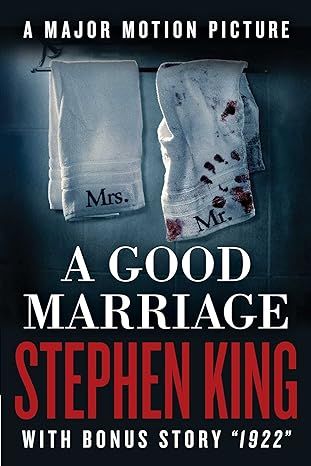
A Good Marriage
4.1
-
5,995
$4.99
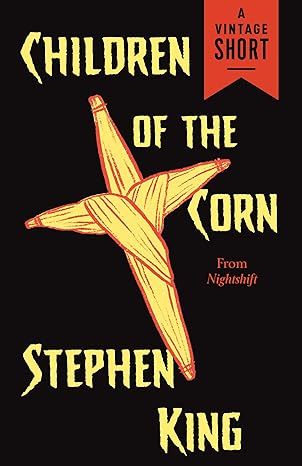
Children of the Corn (Kindle Single) (A Vintage Short)
4.3
-
1,084
$0.99
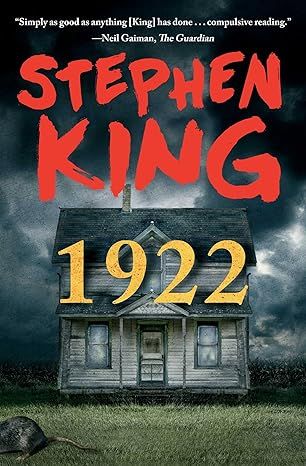
1922
4.6
-
6,082
$7.99
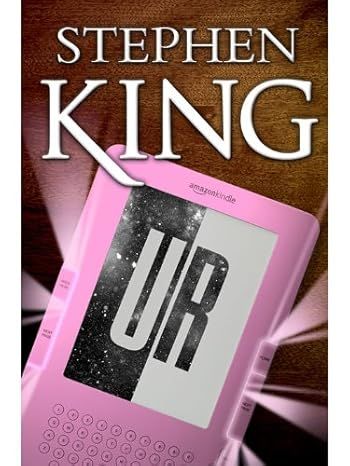
UR
4.3
-
6,140
$3.99
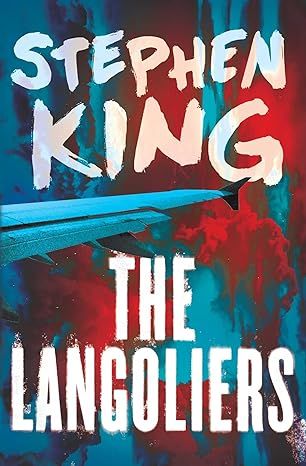
The Langoliers
4.6
-
1,014
$6.49
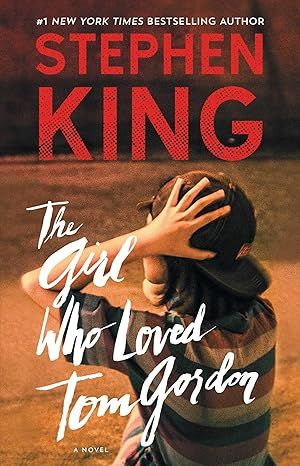
The Girl Who Loved Tom Gordon: A Novel
4.5
-
4,774
$1.17
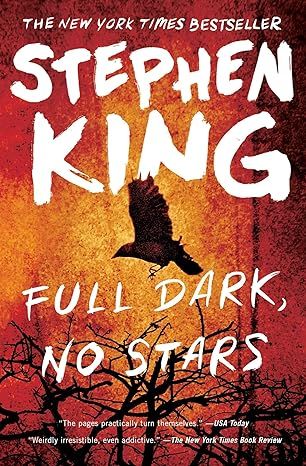
Full Dark, No Stars
4.6
-
6,762
$5.00
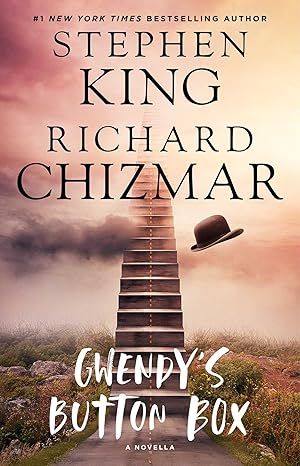
Gwendy's Button Box: A Novella (Gwendy's Button Box Trilogy Book 1)
4.5
-
21,335
$3.88
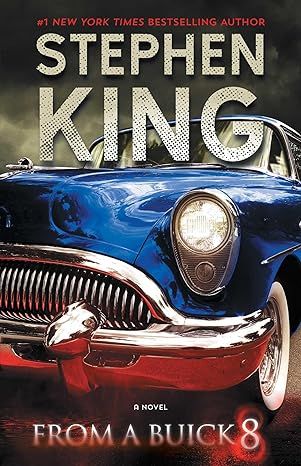
From a Buick 8: A Novel
4.3
-
2,174
$11.99
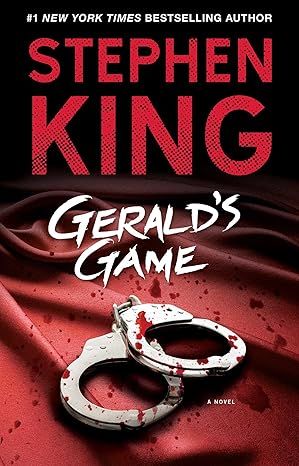
Gerald's Game
4.2
-
3,838
$1.97
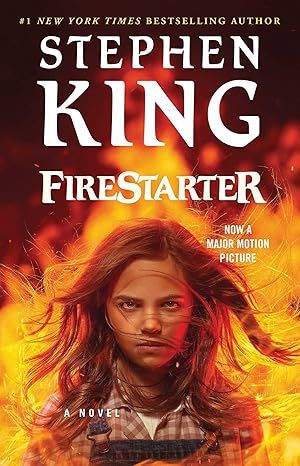
Firestarter
4.6
-
5,489
$9.99
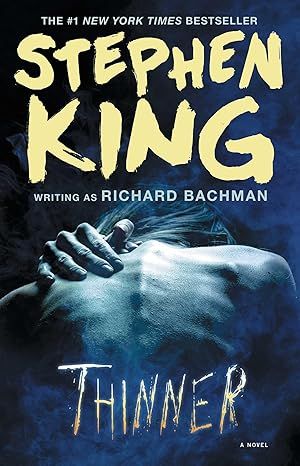
Thinner
4.5
-
3,107
$2.50
Best Sellers
View all
The Tuscan Child
4.2
-
100,022
$8.39

The Thursday Murder Club: A Novel (A Thursday Murder Club Mystery)
4.3
-
155,575
$6.33

Sapiens: A Brief History of Humankind
4.6
-
140,302
$13.49

The Butterfly Garden (The Collector, 1)
4.3
-
88,556
$9.59

Things We Hide from the Light (Knockemout Series, 2)
4.4
-
94,890
$11.66

The Last Thing He Told Me: A Novel
4.3
-
154,085
$2.99

The Perfect Marriage: A Completely Gripping Psychological Suspense
4.3
-
143,196
$9.47

The Coworker
4.1
-
80,003
$13.48

First Lie Wins: A Novel (Random House Large Print)
4.3
-
54,062
$14.99

Mile High (Windy City Series Book 1)
4.4
-
59,745
$16.19

Layla
4.2
-
107,613
$8.99

The Locked Door
4.4
-
94,673
$8.53
